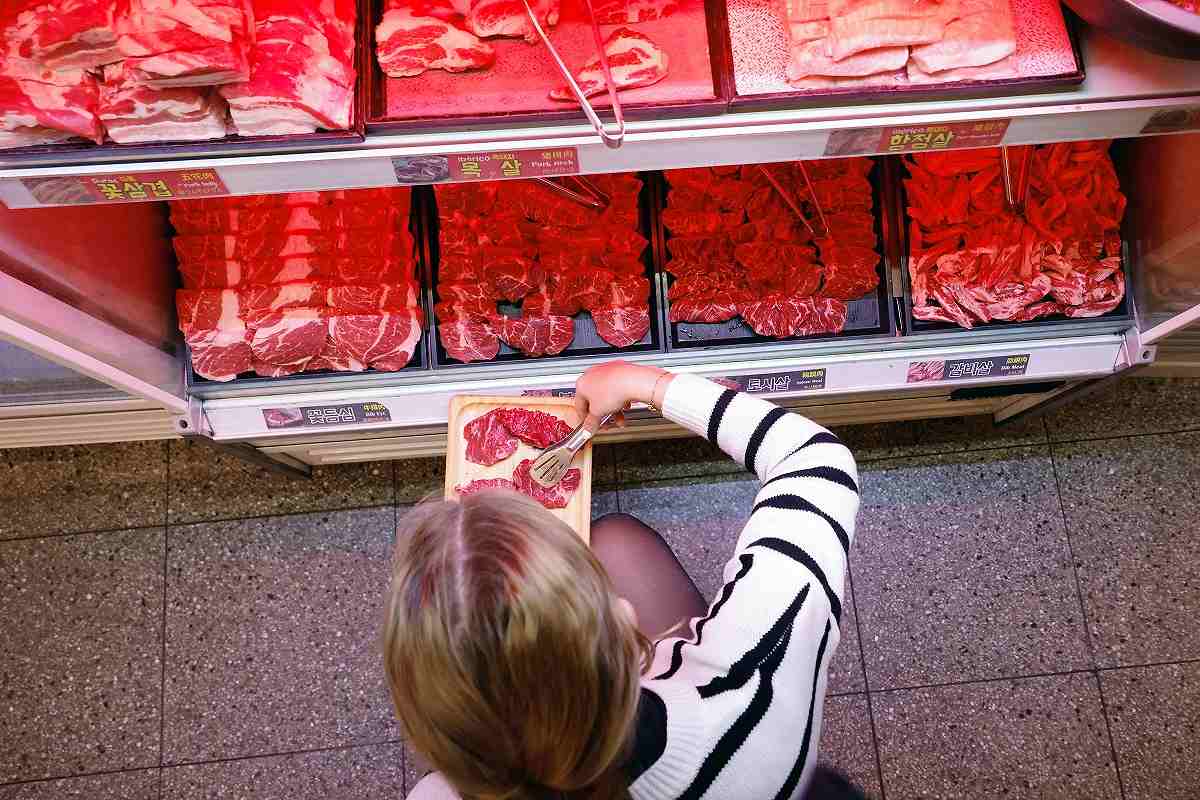
A woman puts beef on a plate at a Korean barbecue restaurant in Seoul on March 8.
18:18 JST, March 29, 2024
SEOUL (Reuters) — South Korean researchers have grown beef cells in rice grains in what they say is a major step toward achieving a sustainable, affordable and environmentally friendly source of protein that could replace farmed cattle for meat.
Prof. Jinkee Hong of Yonsei University in Seoul, who led the research published in the journal Matter this month, said the “beef rice” is the first product of its kind. It uses grain particles as the base for cultivating animal muscle and fat cells.
In the research, rice grains were treated with enzymes to create an optimal environment for cell growth, then infused with bovine cells that are cultivated to achieve the final hybrid product, which resembles a pinkish grain of rice.
The Yonsei team is not the first to work on lab-grown meat products. Companies around the world have launched cultivated meat; one of the latest involves plant-based chicken and eel cultivated from a soy base, marketed in Singapore.
Hong’s team said rice has an advantage in terms of safety relative to soy or nuts because fewer people are allergic to it.
“If successfully developed into food products, cultured beef rice could serve as a sustainable protein source, particularly in environments where traditional livestock farming is impractical,” he said.
The beef rice contains approximately 8% more protein and 7% more fat than conventional rice. Hong noted the protein is 18% animal-based, making it a rich source of essential amino acids.
Priced at about $2 per kilogram and with a far smaller carbon footprint than traditional beef products, cultured beef rice could compete on grocery shelves, Hong said.
Hong said challenges remain from a technical standpoint and in terms of winning over customers with flavor and texture.
Keum Dong-kyu, who recently sampled the rice beef at a Korean barbecue restaurant in Seoul, said the idea is innovative.
“But honestly, I don’t think it can replicate the juiciness or texture of real beef,” Keum said.
Christian Krammel, who is visiting from Germany, was more positive.
“Now, it does not compare to beef yet, but as I see the research is in early stages, I would say it’s a great way forward,” Krammel said.

Hybrid beef rice is set on a table at the Reuters studio in Seoul.
Top Articles in Science & Nature
-

Japan Institute to Use Domestic Commercial Optical Lattice Clock to Set Japan Standard Time
-

Space Mission Demonstrates Importance of International Cooperation, Astronaut Kimiya Yui Says
-

Japan to Face Shortfall of 3.39 Million Workers in AI, Robotics in 2040; Clerical Workers Seen to Be in Surplus
-

Record 700 Startups to Gather at SusHi Tech Tokyo in April; Event Will Center on Themes Like Artificial Intelligence and Robotics
JN ACCESS RANKING
-

Japan Institute to Use Domestic Commercial Optical Lattice Clock to Set Japan Standard Time
-

Israeli Ambassador to Japan Speaks about Japan’s Role in the Reconstruction of Gaza
-

Man Infected with Measles May Have Come in Contact with Many People in Tokyo, Went to Store, Restaurant Around When Symptoms Emerged
-

Prudential Life Insurance Plans to Fully Compensate for Damages Caused by Fraudulent Actions Without Waiting for Third-Party Committee Review
-

Woman with Measles Visited Hospital in Tokyo Multiple Times Before Being Diagnosed with Disease

























